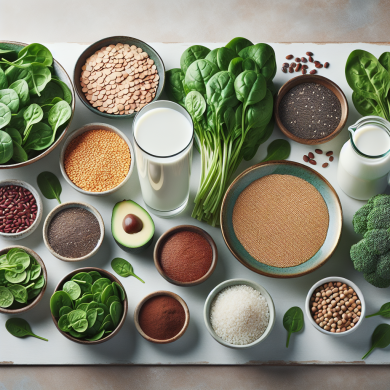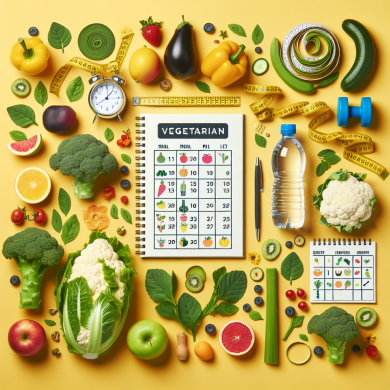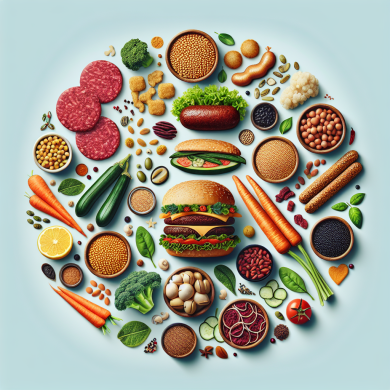Common Pitfalls in Vegetarian Diets
Introduction
Adopting a vegetarian diet can be a rewarding choice for both health and ethical reasons. However, simply omitting meat from your meals does not automatically ensure a balanced diet. Without proper planning and awareness, vegetarians can encounter several nutritional pitfalls. This article explores some common mistakes in vegetarian diets and offers guidance on how to address them to maintain optimal health.
Inadequate Protein Intake
One of the most discussed concerns for vegetarians is protein intake. Protein is crucial for muscle repair, immune function, and enzyme production. While meat is a well-known source of protein, there are plenty of plant-based alternatives that can meet dietary needs.
Plant-Based Protein Sources
Vegetarians can obtain protein from various sources, including legumes, tofu, tempeh, seitan, quinoa, and nuts. It’s essential to incorporate a variety of these foods to ensure an adequate intake of all essential amino acids.
Combining Foods for Complete Proteins
Some plant-based proteins are incomplete, meaning they lack one or more essential amino acids. Combining different protein sources, such as rice and beans or hummus and pita, can help create complete proteins.
Iron Deficiency
Iron is vital for transporting oxygen in the blood. Vegetarians may be at risk of iron deficiency because plant-based iron (non-heme iron) is not absorbed as efficiently as the heme iron found in animal products.
Enhancing Iron Absorption
To improve iron absorption, vegetarians should consume iron-rich foods like lentils, spinach, and fortified cereals alongside vitamin C-rich foods like oranges, strawberries, and bell peppers.
Monitoring Iron Levels
Regularly monitoring iron levels through blood tests can help vegetarians manage their iron status and avoid potential deficiencies.
Vitamin B12 Deficiency
Vitamin B12 is critical for nerve function and the production of DNA and red blood cells. It is primarily found in animal products, which poses a challenge for vegetarians.
B12 Sources for Vegetarians
Vegetarians should seek out fortified foods such as plant-based milks, breakfast cereals, and nutritional yeast to obtain adequate B12 levels. Alternatively, B12 supplements are available and can be an effective solution.
Calcium and Vitamin D Deficiency
Calcium and vitamin D are essential for bone health. Dairy is a well-known source of both nutrients, but those following a vegetarian or vegan diet may need to find alternatives.
Calcium-Rich Vegetarian Foods
Vegetarians can look to leafy greens, almonds, chia seeds, and fortified plant-based milks for calcium. Ensuring a variety of these foods in the diet can help meet calcium needs.
Vitamin D Considerations
Vitamin D can be more challenging to obtain, especially in regions with limited sunlight exposure. Fortified foods and supplements can be valuable, and spending time outdoors in sunlight can also help boost vitamin D levels.
Omega-3 Fatty Acids
Omega-3 fatty acids play a crucial role in heart health and brain function. Fish is a common source of omega-3s, but vegetarians need to find alternative sources.
Plant-Based Omega-3 Sources
Flaxseeds, chia seeds, walnuts, and hemp seeds are excellent plant-based sources of omega-3s. Including these in the diet can help ensure adequate intake.
Sourcing DHA and EPA
While plant sources provide ALA (a type of omega-3), DHA and EPA are primarily found in fish. Algal oil supplements can provide DHA and EPA for vegetarians.
Overreliance on Processed Foods
In the quest for convenience, vegetarians may turn to processed meat substitutes and ready-to-eat meals. While handy, these foods can be high in sodium, unhealthy fats, and additives.
Emphasizing Whole Foods
Focusing on whole, unprocessed foods like fruits, vegetables, whole grains, and legumes can promote better health and provide a range of nutrients.
Reading Labels
For those who do choose processed foods, reading labels carefully can help make informed choices. Opt for products with minimal ingredients and avoid those high in sodium and unhealthy fats.
Insufficient Caloric Intake
Transitioning to a vegetarian diet without adequate planning can result in insufficient calorie intake, leading to fatigue and unintended weight loss.
Balancing Caloric Needs
Ensuring meals are balanced with a variety of macronutrients and adequate portion sizes can help meet caloric needs. Including healthy fats like avocados and nuts can also boost calorie intake.
Conclusion
While vegetarian diets can offer numerous health benefits, they require careful planning to avoid common pitfalls. By being mindful of protein sources, nutrient deficiencies, and food choices, vegetarians can enjoy a balanced and healthful diet. Regular check-ups with a healthcare provider or a registered dietitian can also help ensure nutritional needs are being met.















Add comment